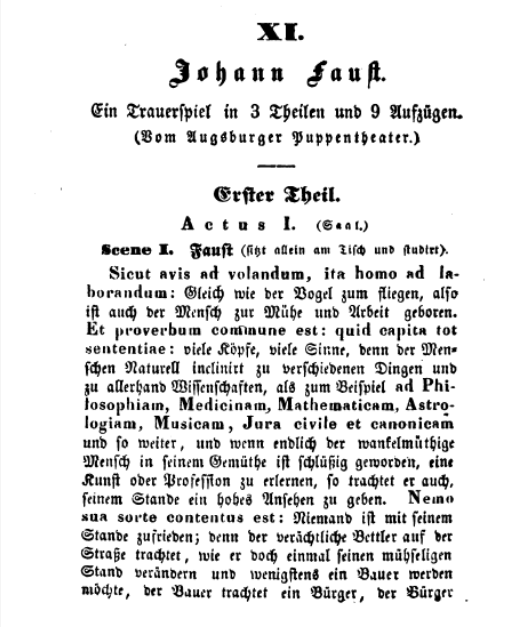
Printed
36 pages
Johann Faust
Ein Trauerspiel in 3 Theilen und 9 Aufzügen. (Vom Augsburger Puppentheater.)
Johnn Scheible was a German publisher and bookseller, known particularly for his review Das Kloster [the Convent], published in Stuttgart from 1845 to 1850. It dealt with all forms of popular texts using the German language. Several puppet plays featured among the many sources published by Scheible at that time. Thus, barely a year after Simrock’s Faust, he published six Faust, among which was the version August von Below had published in 1836. As had already been the case with the Don Juan published the year before, in 1846, Scheible printed plays from the repertory of puppet theatres from Ulm, Augsburg and Strasbourg. The present version is from Augsburg.
An ambitious erudite sells his soul to the devil
The ambitious Doctor Faust begins learning black magic and makes a deal with the devil Mephistopheles: he promises him his soul on condition that the latter agrees to serve him. Faust goes to Parma with Mephistopheles and his houseboy Hans Wurst. The houseboy was asked to keep the identity of his master secret, but he gives it away to the duke of Parma as soon as he arrives there. Faust makes several spectacular natural phenomena appear before the duke (Mount Etna erupting, a sea tempest) but the duke’s courtiers hate him for showing the duke their true nature. Faust is forced to flee. Although Hans Wurst is dismissed, he finds refuge with Wagner, Faust’s servant. Mephistopheles eventually secures Faust’s soul by making Helen of Troy fall in love with him. He also shows him that his generosity will not save him, because its benefits also had harmful effects on his protégés. Faust understands that he is damned, takes leave of Hans Wurst and Wagner, and hands himself over to Hell when midnight strikes.
Publications and translations
Johann Scheible: Das Kloster. Weltlich und Geistlich. Stuttgart, Johann Scheible, 1847